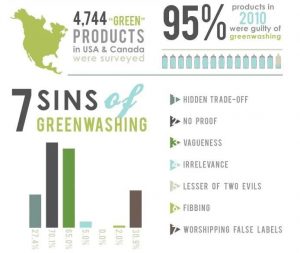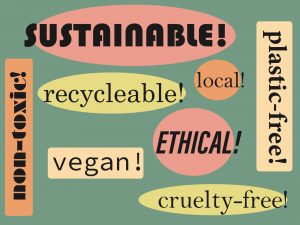In the world of consumerism, providing “eco-friendly” brands and products has become extremely popular and these products are being advertised to persuade customers that their companies are environmentally conscious. However, with this rise of awareness has come greenwashing. Greenwashing occurs when companies mislead buyers by making them believe that their products or company as a whole are environmentally conscious and actively sustainable when they are not.

This marketing strategy allows buyers to continue to consume products with a less guilty conscience because the products they are buying appear to be not as harmful to the environment as others. This misleading branding can occur in a variety of businesses, however, is proved most prominent in the fashion industry. Brands such as Natural Life and Free People may brand themselves as being kind to the Earth through the type of products they sell, and have priced their items extremely high because of this false reputation.
Although brands are beginning to label themselves with phrases such as “eco-friendly, recycle, sustainable, non-toxic, or environmentally-conscious,” there is no evidence to support these claims. This exploitation of being sustainable is extremely misleading to the consumer and allows for the company to charge more for a product because it is deemed better for the environment.

One way to avoid greenwashing is to research a product before buying. Include ingredients and manufacturers in your research to ensure you are buying from a brand that is truly environmentally conscious. Another solution is buying products such as clothing second-hand from places such as local thrift stores or online second-hand stores such as Depop and Poshmark. Buying locally produced food can also ensure that greenwashing in the food industry is avoided. Genuinely eco-friendly products will often have widely available facts and proof of their eco-consciousness that are readily available for consumers; all you need to do is research! Being an informed consumer will help guarantee that you are making truly sustainable decisions when shopping for new products.
Sources:
https://www.investopedia.com/terms/g/greenwashing.asp
https://www.consciouslifeandstyle.com/how-to-identify-greenwashing/